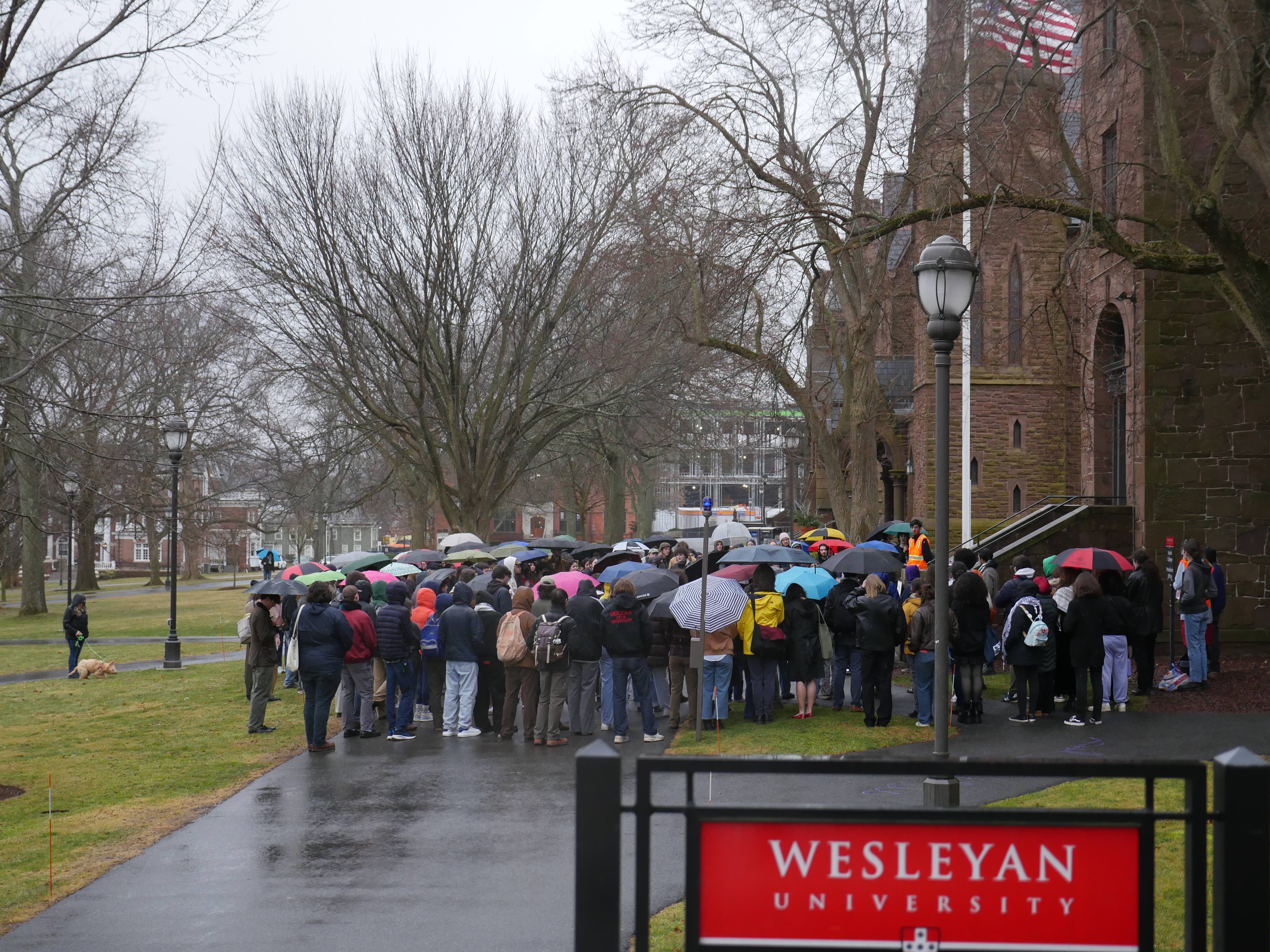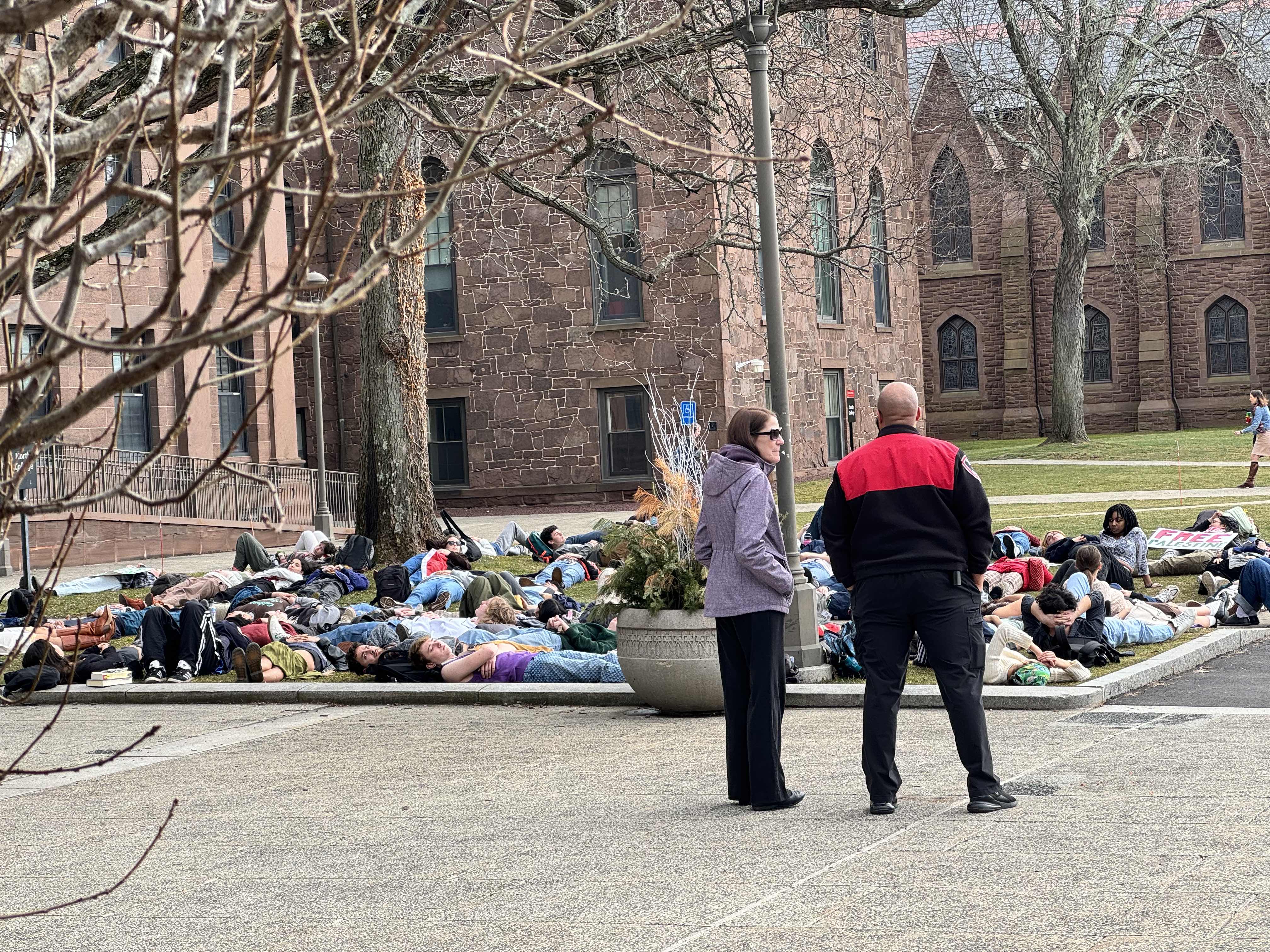
Divestment—the act of reducing financial exposure to an asset in the interest of financial or social goals—has been a major topic of discussion at the University following Howard Bunsis’ external audit of University finances in September 2023, student protests regarding the Israel-Hamas conflict, and the publication of an anonymous zine, “Begging for Table Scraps.”
Divestment movements, popularized during the 1980s with the South African anti-apartheid movement, have resurged following the Israel-Hamas conflict that began on Oct. 7, 2023. Since then, many pro-Palestinian groups have placed pressure on universities across the United States to divest from defense contractors and military supply companies—and sometimes also other corporations—that operate in Israel. Such demands circulated at the University in 2014, when the Wesleyan Student Assembly (WSA) passed a resolution calling for the endowments of the University and the WSA itself to be divested from companies that provide military support or infrastructure for the occupation of the Gaza Strip, the West Bank, and East Jerusalem.
Previous divestment movements at the University also focused on coal and gas. In 2019, the WSA passed a resolution to divest its endowment from the fossil fuel industry. The same year, the board of trustees voted to divest the endowment from fossil fuels, with a stated goal of full divestment by the year 2030. In a statement to The Argus, the University confirmed that, as of this article’s publication, the endowment is on track to meet this goal by 2031 and anticipates that most, if not all, capital invested in natural resources will be returned to the University endowment by that deadline.
The anonymous zine alleged that the University has $41 million invested directly in fossil fuels and expresses skepticism about the extent of the pledged divestment, claiming that the endowment will almost certainly continue to be peripherally invested in fossil fuels. While the University does release figures on the value of the Total Investment Pool, which includes the working capital as well as the portion of the endowment currently in long-term investments, it does not publish the percentage of funds invested in any particular asset class.
A May 2021 Argus opinion piece written by members of the Committee for Investor Responsibility (CIR), an auxiliary committee of the WSA, claimed that the University had only 2%—approximately $20 million—invested directly in oil and gas and that this figure had decreased since previous years. According to the Year End Letters published by the Investments Office since June 2021, the endowment has seen a 59.7% increase in the value of its investments in natural resources since the publication of that article, which means the current value of the natural resources asset class can be extrapolated as about $41 million after FY 2022 and $31.8 million at the end of FY 2023. These fluctuations are primarily due to the changing market value of existing investments; the University reported that it has not made any new investments in fossil fuels since 2019, and current investments in fossil fuels are not being renewed when they expire.
“Wesleyan no longer invests in managers focused on oil and gas assets, and this part of the portfolio is winding down,” the Investments Office’s 2023 Year End Letter states.
According to its website, the University’s Investments Committee follows a resolution passed by the board of trustees in 2015, which stated that in selecting external managers or direct investments, the Committee should consider environmental, social, and governance factors and report on them in internal memos.
In response to a question about whether the University’s funds are invested in any defense contractors for Israel—or in companies that trustees work for, such as Thermo-Fisher, Google, or IBM—the Office of University Communications sent a general statement emphasizing that Wesleyan investment officers do not make decisions about individual investments, but rather select and hire a set of managers to build the portfolio.
“The Investments Office allocates capital to investment managers and not to individual stocks,” the statement reads. “It does so through a rigorous selection process that is aligned with the University’s values and constraints defined by the Board of Trustees.”
In the statement, University administrators expressed a belief that ethical investment is compatible with financial success.
“We will never compromise on our principles for short-term returns and believe that managers who possess both investment acumen and high professional standards will have the most sustainable outperformance,” the statement reads.
However, Environmental Solidarity Network (ESN) administrator Annie Volker ’24 expressed wariness about the University’s actual progress toward fossil fuel divestment.
“Knowing what I know about the Sustainability Strategic Plan [SSP]…it’s something that they voted to approve, but it isn’t something that they’re bound to legally,” Volker said. “This is just a document that they said yes on, but it’s not a document that they made any actionable steps towards implementing.”
Volker also expressed frustration at the way President Michael Roth ’78 treated this issue while answering student questions at a recent WSA meeting. She noted a perceived difference in transparency about the University’s assets in public investments, which are traded on the open market and available to the general population, and private investments, which are made between institutional money managers and individual companies or firms.
“The way that [Roth] talked about what divestment looked like was not at all the way that the Office of Investments portrayed it to me,” Volker said. “He was saying, ‘Oh, we’re not publicly invested in [fossil fuels],’ which is true, but there are also all those private investments that don’t necessarily have a timeframe [for divestment].”
Instead, Volker says, responsibility for implementing the University’s sustainability goals has fallen to students and faculty at the University, particularly those working with the Sustainability Office.
Roth argued that divestment from fossil fuels is not an effective way for the University to work toward climate justice. While he acknowledged the symbolic value of the divestment pledge, he encouraged students to focus on other strategies, such as political activism and working to limit their individual carbon footprints.
“We [decided to divest from fossil fuels] anyway because I thought symbolically, we’ve marked our efforts to respond to the climate catastrophe,” Roth said. “I think it’s easier to worry about the investment of your university, which people don’t really understand anyway, than to make a choice yourself as a person where you have to give up something.”
On Thursday, Nov. 16, 2023, WesDivest, a coalition of students who take issue with the University’s financial stake in the Israeli state, published an open letter on Instagram calling for the endowment to be divested from a list of companies that they held responsible for human rights abuses in Palestine. On Saturday, Nov. 18, 2023, WesDivest members gathered in front of North College and staged a die-in on the first floor of Usdan University Center to express this demand. Attendees chanted, gave speeches, and confronted Roth and the trustees as they departed from their meeting in the Daniel Family Commons.
“We want to do everything in our power to make our voices heard,” graduate student and WesDivest organizer Batya Kline said. “Our money going to killing Palestinian people is absolutely unacceptable.”
The letter also called for the removal of board of trustees Chairman John B. Frank ’78 P’12 from the board, as well as the removal and barring from the board of trustees of any person who works for the listed companies.
Roth believed this change would have little impact since trustees do not receive direct financial benefits from their seats on the board.
“None of [the trustees] benefit personally from decisions we make at Wesleyan—they’re all actually giving time and money,” Roth said. “And most of the time they err on the side of—if it looks like there could be any kind of conflict [of interest]—to not be involved, because as volunteers, they don’t need the aggravation that would come from accusations that there was a conflict.”

According to WesDivest organizer B Frankenstein ’25, the group had received verbal confirmation by Friday, Nov. 17, 2023 that all trustees had read their open letter.
“Additionally, a group of several WesDivest members met with representatives from the Board on Friday November 17th to discuss paths forward,” Frankenstein wrote in an email to The Argus. “The Board members we met with were various levels of supportive or skeptical, and they informed us about the process to bring the letter to a vote.”
For the board to vote on the letter at its February or May meeting, the CIR needed to be re-formed, which happened this semester. A subcommittee on the CIR can now conduct research, revise the letter, and present it to the board for a vote.
Roth, who recently published an article entitled “Cease-Fire Now” urging institutional leaders to call on political figures to end the violence in Gaza, expressed that he did not see divestment as a meaningful path toward peace.
“In regard to what’s happening in Gaza, I don’t think the United States is enabling Israel to operate its military,” Roth said. “That’s just not a portfolio question, it is a political question.”
He also expressed frustration with the way that pro-Palestinian activists have framed the ongoing conflict, especially by calling for the Israeli military to simply abate its offensive.
“It’s not like no one’s fighting,” Roth said. “Get Hamas to surrender and release their hostages instead of keeping them and raping them, which is the current situation, according to the UN. And the fact that the so-called progressive activists at Wesleyan never mentioned that, I find appalling.”
More generally, Roth does not believe the board of trustees should necessarily act in accordance with the political opinions that students express.
“I think the board should be thinking about the long-term future of the school,” Roth said. “I don’t think board members have to reflect the political opinions of the students at any given time. There are 30,000 alums. They represent them as much as they represent a sophomore.”
As for current divestment efforts made by students, Volker said that while ESN is focused on fossil fuel divestment, they see it as intrinsically tied to the movement to divest from Israel.
“[The ESN is] a part of the WesDivest campaign, but we cannot claim all credit for it,” Volker said. “It’s been a huge coalition of students across campus. I want to highlight the inherent ties between human and environmental destruction, how we’ve recognized and are working towards full divestment.”
Applications to join the CIR this year closed on April 5, but interested students should contact WSA Student Life Committee Chair Ruby Clarke ’24 at rclarke@wesleyan.edu or attend the WSA’s weekly meetings on Sundays at 6 p.m. in Boger 114.
Rose Chen can be reached at rchen@wesleyan.edu.



Leave a Reply